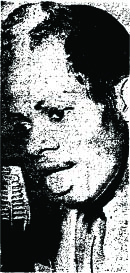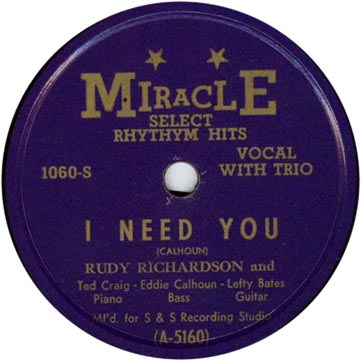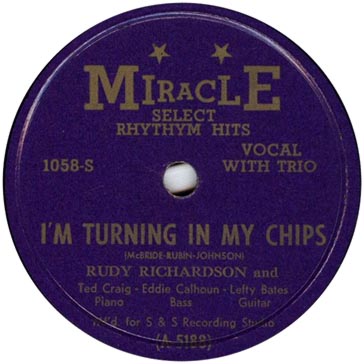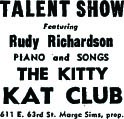Difference between revisions of "The Story of Bronzeville's Gay Icon: Rudy Richardson"
m |
|||
| (4 intermediate revisions by 3 users not shown) | |||
| Line 1: | Line 1: | ||
| − | + | Text by Tristan Cabello. Copyright (©) by Tristan Cabello, 2008. All rights reserved. | |
| + | __noTOC__ | ||
| − | |||
| − | Born Rudolph Richardson Riles in Memphis in 1924, Rudy was a young child when his family moved to Chicago. | + | [[Image:Richardson.jpg|frame|left| The only photograph available of Rudy Richardson, most likely published by the Chicago Defender in the early 1940s]]Born Rudolph Richardson Riles in Memphis in 1924, Rudy was a young child when his family moved to Chicago. |
| Line 9: | Line 9: | ||
| − | + | ||
| + | |||
| + | |||
| + | |||
| + | |||
| + | |||
| + | |||
| + | |||
| + | |||
| + | |||
| Line 15: | Line 24: | ||
| − | [[Image:Richardsonlabel.jpg|frame | + | [[Image:Richardsonlabel.jpg|frame|Rudy Richardson, 78 rpm]] |
An effeminate man, Rudy Richardson usually accompanied himself on the piano in the clubs, abd was often dubbed as "America's only male torch singer." Rim Records published his first singles with a release party scheduled for August 16, as advertised in a sizable display in the Chicago Defender. | An effeminate man, Rudy Richardson usually accompanied himself on the piano in the clubs, abd was often dubbed as "America's only male torch singer." Rim Records published his first singles with a release party scheduled for August 16, as advertised in a sizable display in the Chicago Defender. | ||
| − | + | [[Image:Richardsonlabel2.jpg|frame|Rudy Richardson, 78rpm]] | |
| − | [[Image:Richardsonlabel2.jpg|frame | ||
| Line 41: | Line 49: | ||
[[Image:rudy.jpg|frame|none|Chicago Defender, June 1958]] | [[Image:rudy.jpg|frame|none|Chicago Defender, June 1958]] | ||
| − | Richardson was found dead in a Memphis hotel room due to an | + | Richardson was found dead in a Memphis hotel room due to an “an overdose of narcotics.” |
| + | |||
[http://outhistory.org/wiki/Queer_Business:_The_Case_of_Joe_Hughes NEXT: Queer Business: The Case of Joe Hughes] | [http://outhistory.org/wiki/Queer_Business:_The_Case_of_Joe_Hughes NEXT: Queer Business: The Case of Joe Hughes] | ||
| + | |||
| + | |||
| + | {{Protected}} | ||
| + | |||
| + | |||
| + | ==Categories== | ||
| + | [[Category:AFRICAN AMERICANS]] | ||
| + | [[Category:CHICAGO]] | ||
| + | [[Category:BLUES]] | ||
| + | [[Category:MUSIC]] | ||
Latest revision as of 14:03, 8 May 2009
Text by Tristan Cabello. Copyright (©) by Tristan Cabello, 2008. All rights reserved.
Born Rudolph Richardson Riles in Memphis in 1924, Rudy was a young child when his family moved to Chicago.
After graduating from DuSable High, he entered the club scene and was continuously employed in Chicago by the most popular cabarets: Rudy's Chicken Shack, The Hurricane, Chicken Shack, El Casino, Rupneck’s, Kennedy's Honey Dripper Lounge.
Rudi's Early Career
An effeminate man, Rudy Richardson usually accompanied himself on the piano in the clubs, abd was often dubbed as "America's only male torch singer." Rim Records published his first singles with a release party scheduled for August 16, as advertised in a sizable display in the Chicago Defender.
Rudy's Hit Single: "Chauffeur"
“Chauffeur,” his main hit, was a torch song with a pleasant melody in which Richardson sang "I'm broken-hearted, so discarded" and, in the middle, in a spoken monologue “Chauffeur, take me home, I'm really gone... Don't think I'm wiggin', man, I'm just gone, you understand”.
Rudy's Late Career
Rudy released a single on Rim Records in June 1949, featuring "If You Get It" and "You Made My Heart Cry Out". He continued to appear fairly often in Chicago nightspots through the early 50s, including a long residency at the Kitty Kat Club.
Richardson was found dead in a Memphis hotel room due to an “an overdose of narcotics.”
NEXT: Queer Business: The Case of Joe Hughes




